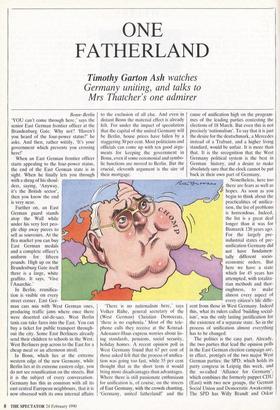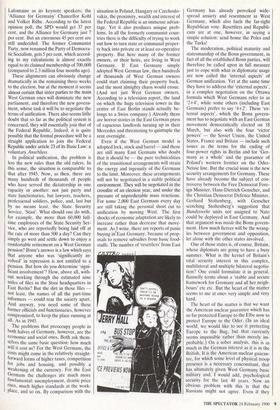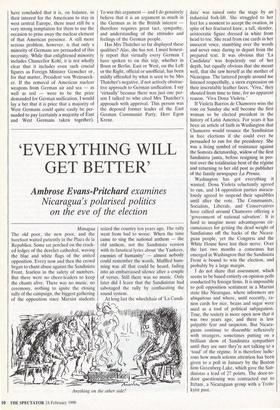ONE FATHERLAND
Timothy Garton Ash watches
Germany uniting, and talks to Mrs Thatcher's one admirer
Bonn—Berlin 'YOU can't come through here,' says the senior East German frontier officer at the Brandenburg Gate. Why not? 'Haven't you heard of the four-power status?' he asks. And then, rather wittily, 'It's your government which prevents you crossing here!'
Further on, an East German guard stands atop the Wall while under his very feet peo- ple chip away pieces to sell as souvenirs. At the flea market you can buy East German medals and a complete officer's uniform for fifteen pounds. High up on the Brandenburg Gate itself there is a large, white graffito. It says, Nive l'Anarchie.'
In Berlin, reunifica- tion is visible on every street corner. East Ger- man cars mix with West German ones, producing traffic jams where once there were deserted cul-de-sacs. West Berlin taxis can take fares into the East. You can buy a ticket for public transport through- out the city. Some East Berliners already send their children to schools in the West. West Berliners pop across to the East for a cheap meal or an afternoon stroll.
In Bonn, which lies at the extreme western edge of the new Germany, while Berlin lies at its extreme eastern edge, you do not see reunification on the streets. But it is the subject of every conversation. Germany has this in common with all its east central European neighbours, that it is now obsessed with its own internal affairs
to the exclusion of all else. And even in distant Bonn the material effect is already felt. For under the impact of speculation that the capital of the united Germany will be Berlin, house prices have fallen by a staggering 30 per cent. Most politicians and officials can come up with ten good argu- ments for keeping the government in Bonn, even if some ceremonial and symbo- lic functions are moved to Berlin. But the crucial, eleventh argument is the size of their mortgage.
'There is no nationalism here,' says Volker Riihe, general secretary of the (West German) Christian Democrats, 'there is no euphoria.' Most of the tele- phone calls they receive at the Konrad- Adenauer-Haus express worries about liv- ing standards, pensions, social security, holiday homes. A recent opinion poll in West Germany found that 67 per cent of those asked felt that the process of unifica- tion was going too fast, while 55 per cent thought that in the short term it would bring more disadvantages than advantages. Where there is still passionate enthusiasm for unification is, of course, on the streets of East Germany, with the crowds chanting, 'Germany, united fatherland!' and the
cause of unification high on the program- mes of the leading parties contesting the elections of 18 March. But even this is not precisely 'nationalism'. To say that it is just the desire for the deutschmark, a Mercedes instead of a Trabant, and a higher living standard, would be unfair. It is more than that. It is the recognition that the West Germany political system is the best in German history, and a desire to make absolutely sure that the clock cannot be put hack in their own part of Germany.
The politics is the easy part. Already, the two parties that lead the opinion polls in the East German election campaign are, in effect, proteges of the two major West German parties: the SPD, which holds its party congress in Leipzig this week, and the so-called 'Alliance for Germany', which combines the formerly puppet CDU (East) with two new groups, the German Social Union and Democratic Awakening. The SPD has Willy Brandt and Oskar
Lafontaine as its keynote speakers; the 'Alliance for Germany' Chancellor Kohl and Volker Riihe. According to the latest opinion poll, the SPD would get 37 per cent, and the Alliance for Germany just 7 per cent. But an enormous 45 per cent are still undecided. The former Communist Party, now renamed the Party of Democra- tic Socialism, gets 5 per cent, which accord- ing to my calculations is almost exactly equal to its claimed membership of 700,000 (compared to 2.3 million four months ago).
These alignments can obviously change dramatically in the remaining three weeks to the election, but at the moment it seems almost certain that sister parties to the main West German ones will dominate the new parliament, and therefore the new govern- ment, whose task it will be to negotiate the terms of unification. There also seems little doubt that so far as the political system is concerned, they will essentially join that of the Federal Republic. Indeed, it is quite possible that the formal procedure will be a straight application to join the Federal Republic under article 23 of its Basic Law: a voluntary Anschluss.
In political unification, the problem is less the new rules than the old rulers. In this sense, the situation is comparable to that after 1945. Now, as then, there are many hundreds of thousands of people who have served the dictatorship in one capacity or another; not just party and state functionaries, but lawyers, teachers, professional soldiers, police, and, last but by no means least, the State Security Service, 'Stasi'. What should one do with, for example, the more than 60,000 full- time employees of the State Security Ser- vice, who are reportedly being laid off at the rate of more than 500 a day? Can they simply go west and settle down to enjoy a comfortable retirement on a West German Pension? Bonn's answer is a law which says that anyone who was 'significantly in- volved' in repression is not entitled to a Pension. But how do you determine 'signi- ficant involvement'? How, above all, with- out working through the estimated nine miles of files in the Stasi headquarters in East Berlin? But the dirt in those files — not least, the names of all the part-time informers — could tear the society apart. And anyway, you need some of these former officials and functionaries, however compromised, to keep the place running at all. As in 1945.
The problems that preoccupy people in both halves of Germany, however, are the economic and social ones. Both ask them- selves the same basic question: how much Will it cost us? For the West Germans, the costs might come in the relatively straight- forward forms of higher taxes, competition for jobs and housing, and possibly a weakening of the currency. For the East Germans the challenges are much more fundamental: unemployment, drastic price rises, much higher standards at the work- Place, and so on. By comparison with the situation in Poland, Hungary or Czechoslo- vakia, the proximity, wealth and interest of the Federal Republic is an immense advan- tage. Yet it also produces unique prob- lems. In all the formerly communist coun- tries there is the difficulty of trying to work out how to turn state or communal proper- ty back into private or at least co-operative property. But here many of the former owners, or their heirs, are living in West Germany. If East Germany simply adopted West German law, then hundreds of thousands of West German owners could start claiming their property back, and the most almighty chaos would ensue. (And not just West German owners. According to a television report, the land on which the huge television tower in the centre of East Berlin stands actually be- longs to a Swiss company.) Already there are horror stories in the East German press of rapacious landlords turning up in their Mercedes and threatening to quintuple the rent overnight.
Even if the West German model is adopted lock, stock and barrel — and there are still many East Germans who doubt that it should be — the pure technicalities of the transitional arrangements will strain the energy and ingenuity of the Germans to the limit. Moreover, these arrangements will not be negotiated in a stable political environment. They will be negotiated in the crossfire of an election year, and under the pressure of unpredictable mass reactions. For some 2,000 East Germans every day are still taking the personal short cut to unification by moving West. The first shocks of economic adaptation are likely to increase rather than decrease that move- ment. As I write, there are reports of panic buying in"East Germany, because of prop- osals to remove subsidies from basic food- stuffs. The number of 'resettlers' from East Germany has already provoked wide- spread anxiety and resentment in West Germany, which also fuels the far-right Republican vote. Resettlers and Republi- cans are at one, however, in seeing a simple solution: send home the Poles and the Turks!
The moderation, political maturity and statesmanship of the Bonn government, in fact of all the established Bonn parties, will therefore be called upon in full measure just to cope with what in diplomatic usage are now called the 'internal aspects' of German unification. Yet at the same time they have to address the 'external aspects', in a complex negotiation on the Ottawa formula which West Germans refer to as '2+4', while some others (including East Germans) prefer to say '4+2'. These 'ex- ternal aspects', which the Bonn govern- ment has to negotiate with an East German movement democratically elected on 18 March, but also with the four 'victor powers' — the Soviet Union, the United States, France and Britain — include such issues as the terms for the ending of four-power rights in Berlin and for 'Ger- many as a whole' and the guarantee of Poland's western frontier on the Oder- Neisse line. But the crucial issue is the new security arrangements for Germany. These have already become the subject of con- troversy between the Free Democrat Fore- ign Minister, Hans-Dietrich Genscher, and the Christian Democrat Defence Minister, Gerhard Stolten berg, with Genscher scotching Stoltenberg's suggestion that Bundeswehr units not assigned to Nato could be deployed in East Germany. And that argument was inside the Bonn govern- ment. How much fiercer will be the wrang- les between government and opposition, let alone with the other states involved.
One of those states is, of course, Britain, whose diplomats are going to have a busy summer. What is the kernel of Britain's vital security interest in this complex, multilateral and multiple bilateral negotia- tion'? One could formulate it in general, flannelly terms about a 'stable and secure framework for Germany and all her neigh- bours' etc etc. But the heart of the matter seems to me at once very simple and very hard.
The heart of the matter is that we want the American nuclear guarantee which has so far protected Europe to the Elbe now to protect Europe to the Oder. (In an ideal world, we would like to see it protecting Europe to the Bug, but that currently seems impossible rather than merely im- probable.) On a sober analysis, this is as much in the German interest as it is in the British. It is the American nuclear guaran- tee, for which some level of physical troop presence is a necessary concomitant, that has ultimately given West Germany basic military and, I would add, psychological security for the last 40 years. Now an obvious problem with this is that the Russians might not agree. Even if they have concluded that it is, on balance, in their interest for the Americans to stay in west central Europe, there must still be a very strong temptation for them to use the occasion to prise away the nuclear element of that American presence. A still more serious problem, however, is that only a minority of Germans are persuaded of this necessity. While that enlightened minority includes Chancellor Kohl, it is not wholly clear that it includes even such crucial figures as Foreign Minister Genscher or, for that matter, President von Weizsaeck- er. If the removal of American nuclear weapons from German air and sea — as well as soil — were to be the price demanded for German unification, I would lay a bet that it is price that a majority of West Germans could quite easily be per- suaded to pay (certainly a majority of East and West Germans taken together). To win this argument — and I do genuinely believe that it is an argument as much in the German as in the British interest — therefore requires great tact, sympathy, and understanding of the attitudes and feelings of the German people.
Has Mrs Thatcher so far displayed these qualities? Alas, she has not. I must honest- ly report that virtually every German I have spoken to on this trip, whether in Bonn or Berlin, East or West, on the Left or the Right, official or unofficial, has been mildly offended by what is seen to be Mrs Thatcher's negative, if not actively obstruc- tive approach to German unification. I say 'virtually' because there was just one per- son I talked to who cited Mrs Thatcher's approach with approval. This person was the deposed former leader of the East German Communist Party, Herr Egon Krenz.




















































 Previous page
Previous page